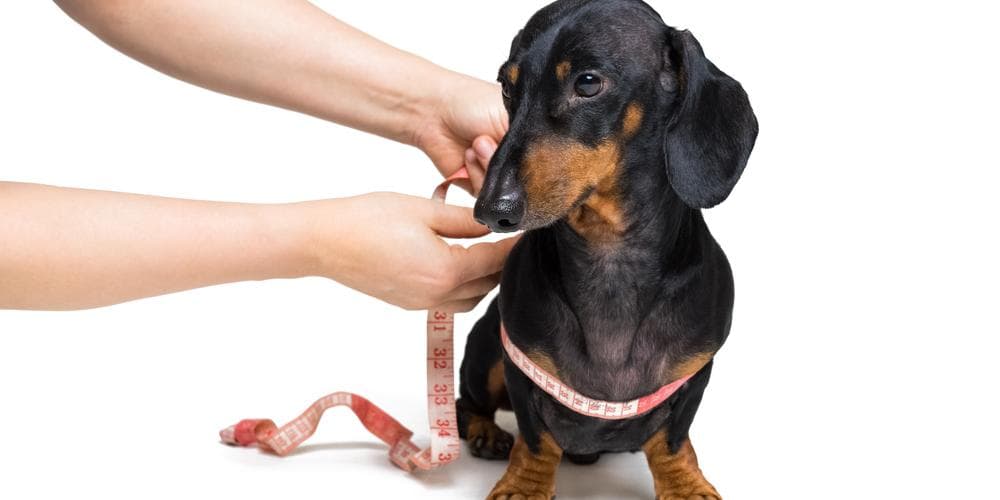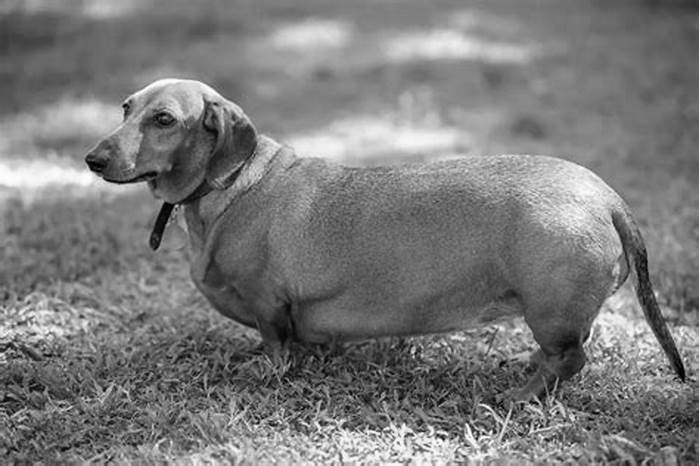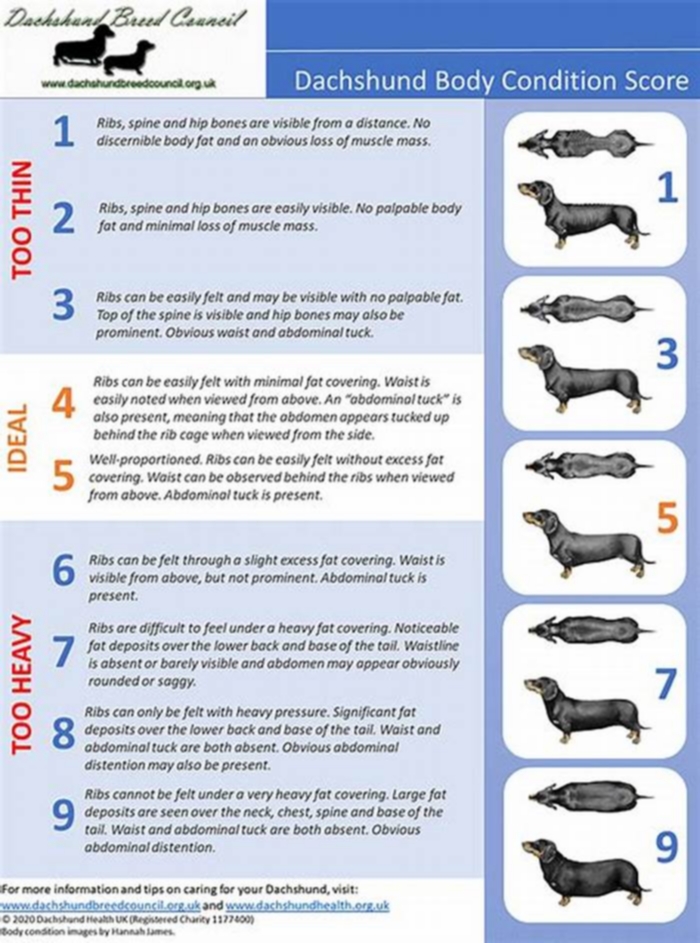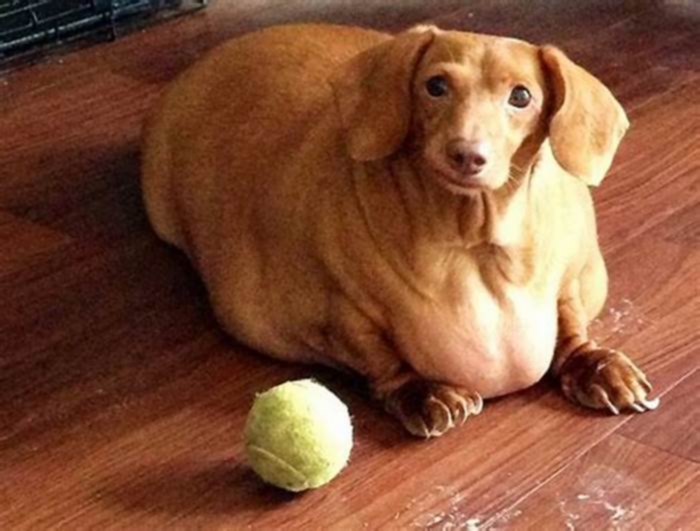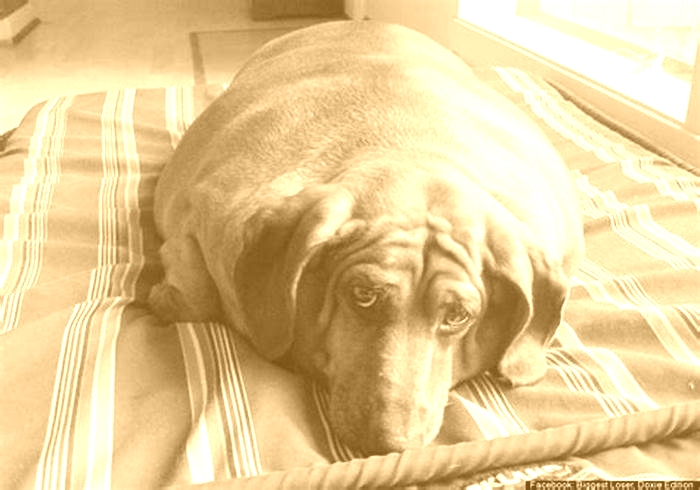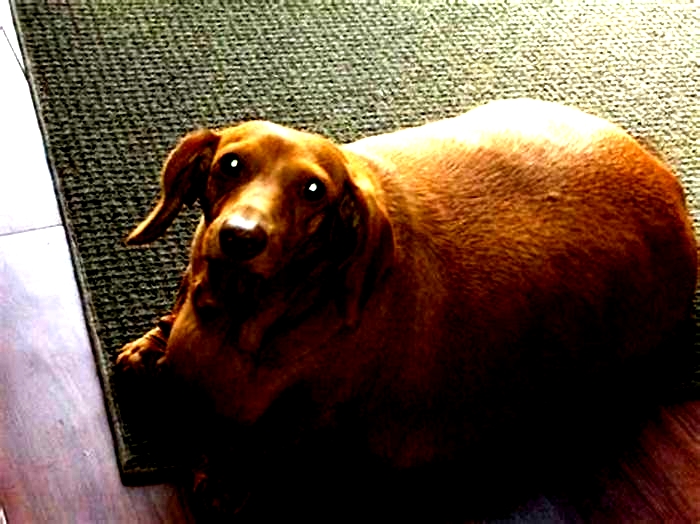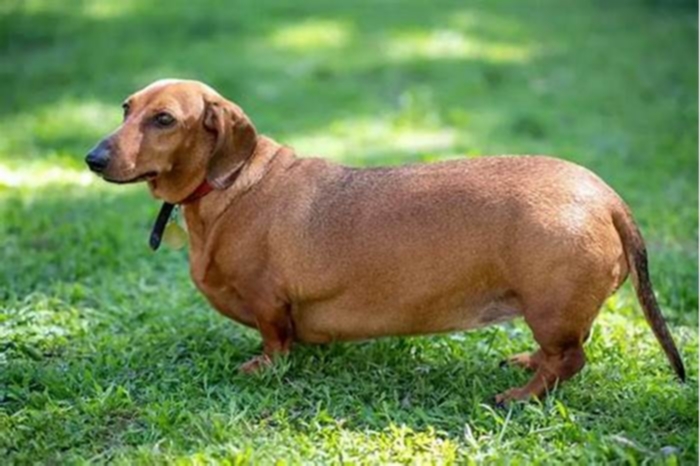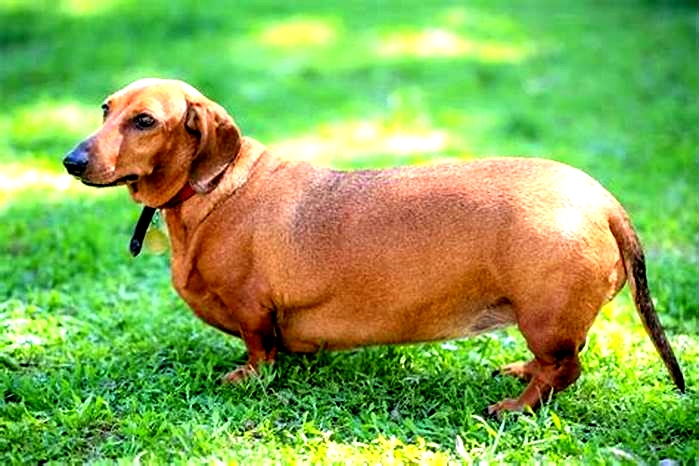Dachshund Obesity The Silent Killer

Dachshund Obesity Is a Real Thing, But You Can Change That
How Can YouHelp Your Doxie Lose Weight?
Dachshunds can be so cute with their low-lying flappy ears and long bodies. They can even become more adorable when they become fat. They look more comical, cuddly, and huggable.
However, theres nothing cute about your overweight doxie developing serious health problems. As you know, being overweight and obese poses great health risks. It may lead to heart diseases, metabolic disorders, and maladies related to the respiratory and musculoskeletal systems.
So, if your doxie is overweight, you need to intervene as soon as you can. To get you started, here are some of the best tips you can use to help your Dachshund lose those unwanted pounds.
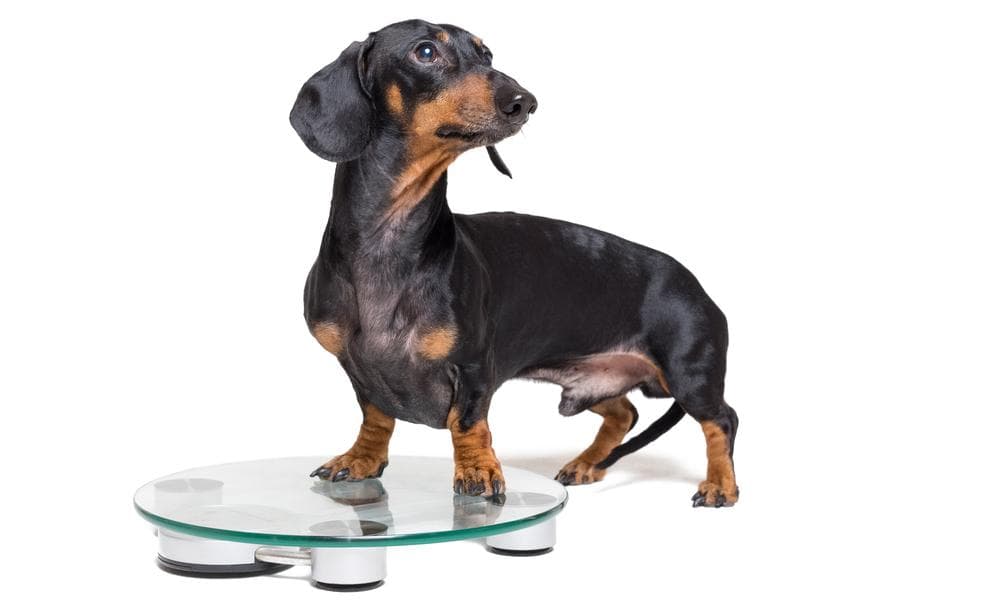
Diet
Obviously, you cant lose weight without talking about diet. Here are some dietary tips to start off your dogs weight loss journey.
- More protein, fewer carbohydrates dogs thrive in a high-protein diet. This helps them build lean muscles and quickly use up excess energy, which may be stored as fats.
- Avoid high-fiber food contrary to popular beliefs, high-fiber food does not help in weight loss. Your doxie wont feel satisfied and will eat more as a result. Not only that but high-fiber food may interfere with nutrient absorption.
- Dont give food scrap while it is tempting to give your adorable doxie leftovers or crumbs from the table, you need to control yourself. It doesnt just encourage bad behavior, but it can contribute to weight gain.
- Feed smaller portions of food instead of giving three large meals, your dog will lose weight faster if you give him frequently, but smaller portions of food. For example, you can divide three big meals into six small meals. Dont give in to the temptation to offer your dog a bowl full of food whenever you leave your home.
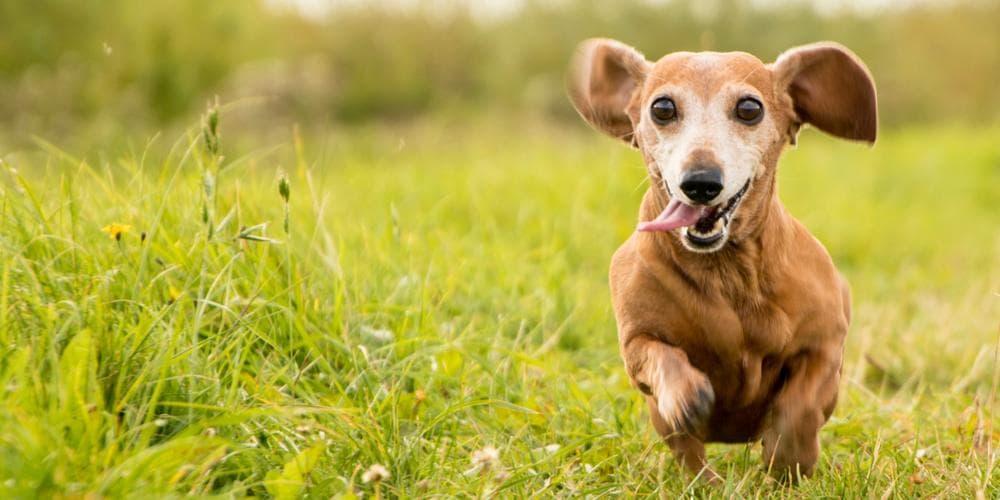
- Reduce your dogs food portion sometimes, the easiest way to lose weight is simply reducing the amount of food you feed your buddy. Now, remember not to drastically lessen your dogs food. As a general rule, reduce your dogs food by five percent for a week or two. After that, if he still doesnt lose weight, then subtract another five percent.
- Schedule your dogs eating habits dont feed your wiener dog at any time of the day. Having a scheduled mealtime will help you monitor your dogs diet. Not only that, but it reinforces discipline too.
- Track everything your dog eats while this may take more work, you will see that it produces results. Write down what you feed your dachshund as well as the amount. Weigh your dogs food and check if it conforms to your weight loss plan.

Exercise
When it comes to losing weight, diet is best coupled with exercise. It doesnt simply help your dog achieve an ideal weight, but it can help your dog become healthier and happier.
There are a lot of great forms of exercise available for your pooch. Walking your dog every morning, jogging with him, hiking, swimming, fetching, and bringing him in the park would surely burn those extra calories. Just be creative to make exercise fun and interesting. With a doxie as your dog, its easier to bring him anywhere since he is relatively small.
Make exercise a habit and schedule it as much as possible. Your dog also thrives in routine. If he routinely gets to exercise at a certain time of the day, it becomes a habit that he can continually do even after achieving his target weight.
Remember that exercise does not have to be done outside. It can be done inside your home. Just keep your pup moving and avoid being inactive. Every calorie burned counts.

Talk To Your Vet
Being overweight, or worse, obese dachshund comes with great health risks. Its a serious problem that you should not ignore. For example, an overweight doxie may easily develop back problems.
If you have an issue with the weight of your pet, it wont hurt calling your vet. He can help you create a weight loss plan, give you advice, and improve your dogs health condition.
Most importantly, read more about weight loss for dogs. The more knowledge and information you gather, the better informed you are in helping your four-legged best friend live a healthier and fuller life.

Preventing Dachshund Obesity: A Comprehensive Guide
Dachshunds have captured the hearts of dog enthusiasts everywhere with their unique charm. However, a concerning issue plagues these adorable canines obesity. Dachshund obesity is a serious health condition that could lead to various problems. In this comprehensive guide, well delve into the reasons behind Dachshund obesity as well as how you could ensure your beloved pets stay happy and healthy.

Understanding Dachshund Obesity
Dachshund obesity occurs when the dog exceeds its healthy weight. This may result in an increase in body fat levels. Dachshunds are a small breed with distinctive characteristics like their long, low bodies. These characteristics, while endearing, also make them more susceptible to weight gain as well as the associated health issues.
Several factors contribute to Dachshund obesity. These include overfeeding, lack of physical activity, genetic predisposition, as well as even human behaviors like sharing table scraps. Medical conditions like Cushings disease may also play a role in obesity. Carrying excess weight can be detrimental to a Dachshunds health. This could potentially lead to spinal problems, respiratory difficulties, joint pain, mobility issues, diabetes, as well as heart disease.
The Rising Prevalence of Dachshund Obesity
Dachshund obesity has become increasingly common in recent years. It poses a growing concern for owners as well as veterinarians. Various Dachshund owners may not fully understand the health risks associated with obesity which lead to inadvertent weight gain in their pets.
The modern lifestyle of several Dachshunds also contributes to the problem. Sedentary routines, overfeeding, as well as unhealthy diets are prevalent issues. Additionally, misconceptions about Dachshunds needing to be chubby exacerbate the situation. Addressing this issue requires a multifaceted approach.
Causes of Dachshund Obesity
Dachshund obesity has several primary causes, with overfeeding as well as poor dietary choices topping the list. Many owners inadvertently overfeed their pets due to their endearing nature and pleading eyes. Lack of knowledge about dietary requirements as well as proper meal sizes for Dachshunds might lead to overfeeding. Low-quality commercial pet foods that are calorie-rich and lack essential nutrients can also contribute to weight gain.
Moreover, indulging Dachshunds with high-calorie treats and table scraps could add significantly to their calorie intake. The lack of regular physical activity as well as exercise further compounds the issue, as Dachshunds burn fewer calories when leading a sedentary lifestyle. Their unique physical characteristics that involve a long body and short legs, make them prone to spinal disorders, which are worsened by excess weight.
Genetics can also play a role in Dachshund obesity. Some Dachshunds may have a genetic predisposition that affects their appetite regulation, metabolism, as well as fat storage. Nonetheless, these make them more susceptible to obesity even with proper diet and exercise.
Environmental factors like overfeeding as well as minimal exercise opportunities, may exacerbate genetic predisposition. Hormonal imbalances, age-related changes, as well as certain medical conditions might also impact a Dachshunds weight. Hence, this makes it a complex issue to address.

Consequences of Dachshund Obesity
A. Joint and Orthopedic ProblemsDachshunds long bodies as well as short legs make them vulnerable to joint and orthopedic issues, especially when carrying excess weight. Obesity places stress on their joints, bones, and ligaments. These could lead to illnesses like intervertebral disc disease, arthritis, as well as hip dysplasia. The added weight strains the spine, increasing the risk of ruptured discs, paralysis, as well as persistent pain, significantly limiting their mobility.
B. Cardiovascular IssuesObese Dachshunds are more prone to cardiovascular problems due to the strain that excess body fat places on their hearts. This could result in conditions like hypertension, cardiac disease, as well as a higher likelihood of heart failure. The hearts effort to pump blood effectively can lead to inadequate oxygen and nutrient delivery to vital organs, further complicating matters. Sedentary lifestyles associated with obesity increase cardiovascular risks as well as decrease physical activity.
C. Reduced LifespanOne of the most alarming consequences of Dachshund obesity is its impact on their lifespan. Obesity is linked to life-threatening conditions. These may include respiratory issues and some cancers. The combination of joint problems as well as cardiovascular complications could significantly reduce a Dachshunds quality of life, prematurely aging them and shortening their lifespan.

Preventing Dachshund Obesity
As responsible Dachshund owners, it is our duty to ensure our furry friends maintain a healthy weight as well as live a life free from obesity-related health problems. We must focus on three essential aspects:
A. Balanced Diet and Portion ControlA well-balanced and nutritious diet is essential for preventing Dachshund obesity. Consult your veterinarian to decide the best diet for your dog depending on its age, size, and overall health. A good dog meal should have a variety of lipids, vitamins, minerals, carbs, and proteins. They provide vital nutrients for the health of your Dachshund.
Portion management is also essential. Dachshund stomachs are tiny. Overfeeding becomes a quick way to acquire weight as a result of this. Follow the feeding instructions on the dog food package or those advised by your veterinarian. Be wary of high-calorie foods and table leftovers. They may have a key role in weight gain. Consider utilizing interactive feeding toys or puzzles to reduce their eating as well as prevent overeating.
B. Regular ExerciseDespite their short legs, Dachshunds are lively dogs who require regular exercise to maintain a healthy weight. Adjust for age and energy level, but aim for at least 30 minutes to an hour of exercise every day. Walking is a terrific low-impact workout, but avoid stairs and high jumps to avoid spinal issues.
Interactive games like fetch or tug-of-war are great for keeping Dachshunds cognitively and physically busy. Arrange playdates with other dogs to promote socialization and exercise.
C. Avoiding Excessive TreatsWhile treats can be useful for training and demonstrating affection, excessive consumption can contribute to weight gain. Maintain a healthy balance and avoid overindulging in treats. Choose healthful, low-calorie snacks or use chunks of their usual kibble as training rewards. Keep in mind that sweets should only account for a tiny fraction of their daily calorie intake. To avoid overfeeding, be aware of hidden calories in sweets and adapt their main meals accordingly.
Regular veterinary appointments are critical in preventing Dachshund obesity as well as other health issues. These examinations allow for the early diagnosis of possible issues as well as crucial advice on maintaining your pets ideal weight and overall health.
During these routine checkups, veterinarians may examine your Dachshunds physical condition, weight, and overall health. They provide guidance on feeding habits, correct nutrition, and exercise regimens that are suited to your dogs specific needs. Furthermore, they may be able to diagnose as well as treat underlying health problems that lead to weight gain.
Your Dachshunds food will be thoroughly examined during veterinarian visits. Its essential to feed your pet a balanced as well as appropriate diet that takes into consideration aspects such as age and activity level. Portion management is essential since even high-quality meals can contribute to overeating. Veterinarians may also offer particular weight management meals or nutritional supplements to enhance general health as well as weight control in your Dachshund.
Regular veterinarian check-ups cover other critical parts of Dachshund care. These could include dental health, vaccines, parasite control, as well as early sickness identification, in addition to weight management. By sticking to these periodic checkups, you can keep informed about your dogs health as well as give them the finest treatment possible throughout their life.

Final Thoughts
Obesity in dachshunds is a real issue that is becoming worse, therefore dog owners and vets need to pay attention. We can make sure that our Dachshunds have long, healthy, and happy lives by being aware of the causes and effects of obesity and taking proactive measures to prevent it. The solution to this urgent health problem is responsible pet ownership, which includes a balanced diet, frequent exercise, and portion control. Lets protect the health of our cherished Dachshunds and value the happiness they provide to our life. Discover more by connecting with our team.
86/ 100
Thank you for reading this post, don't forget to subscribe to our free newsletter
!

